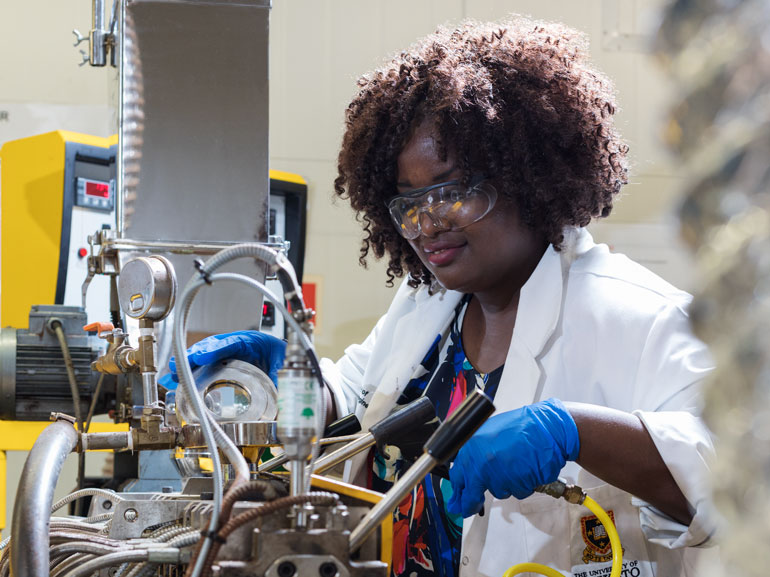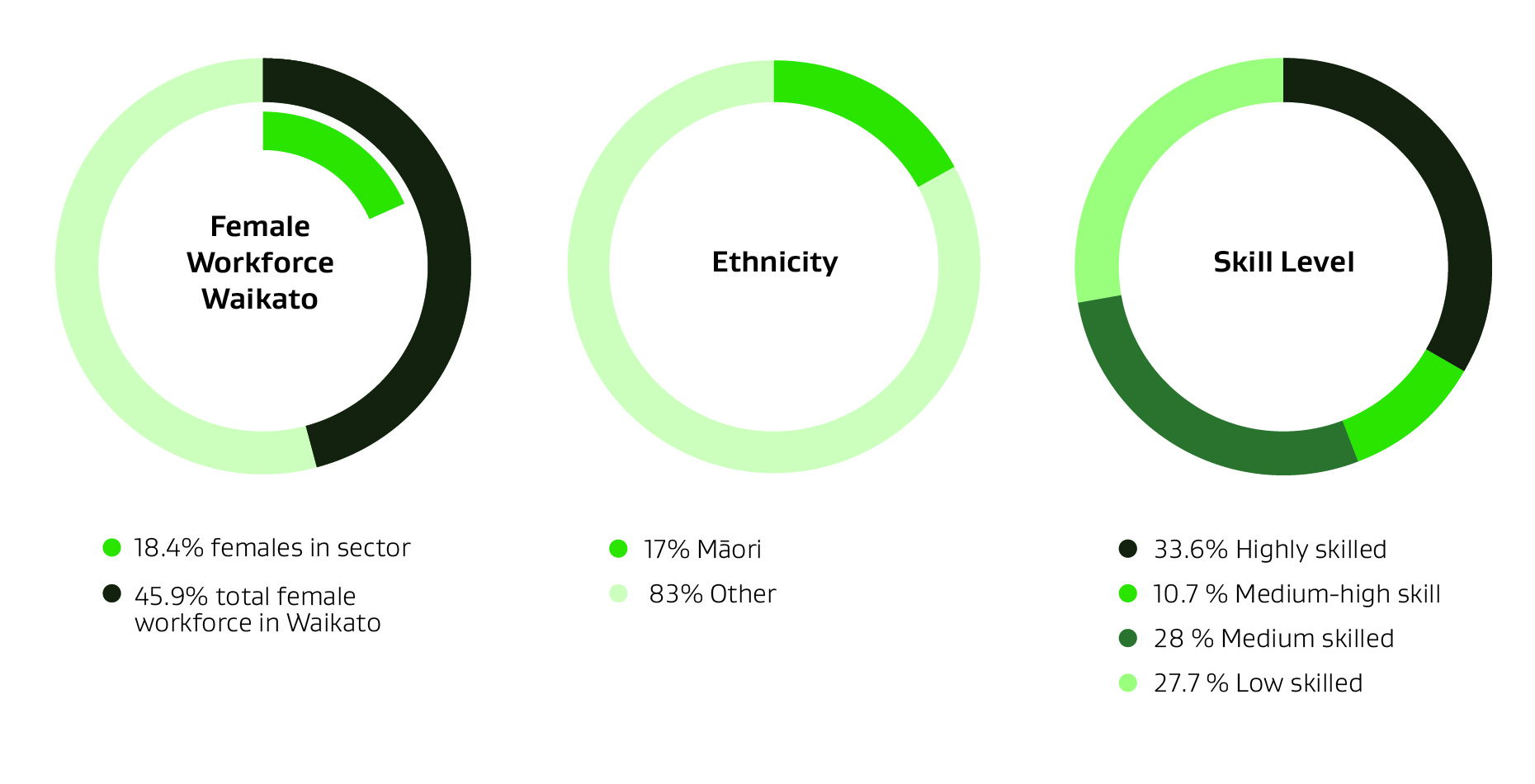Construction and infrastructure
There is vast opportunity to increase capacity and capability to meet the increasing investments in civic and private construction and infrastructure projects across the Waikato. Taking a collaborative approach, the sector is enabled to develop people capacity across all levels of industry.
On this page

Our approach
The Construction and Infrastructure sector is significant for the Waikato, with activity across the entire region and ongoing workforce opportunities in years to come. When the Group engaged with our wider community, 89% of respondents agreed this is a sector the group should focus on.
There are more than 7,000 businesses in this sector across the Waikato, and just over 30,000 jobs. The sector is forecast to be the third top growth industry for the Waikato (by job openings projections), with 11.2% growth in the workforce forecast from 2021 to 2026 (Infometrics Ltd. (2022). Waikato RSLG Area - Construction Sector Profile. Infometrics Ltd.)
The Group has used data from BCITO Workforce information platform to gather a sense of the sector’s future workforce needs. The Group has also considered the significant central government, local government and iwi/Māori investments across the Waikato that in some part will be serviced by workers in this sector. The Group also considered the work completed by the Construction Accord and the existing Construction Sector Transformation Plan.
Key insights
There is vast opportunity to increase capacity and capability to meet the increasing investments in civic infrastructure, and commercial and residential construction projects, across the Waikato.
The sector has a high self-employment rate of 24.4%, compared to the 17.5% average for the total Waikato RSLG area. This provides an opportunity to encourage sole traders to expand their workforce to meet increased demand for their services.
The sector has always grown its workforce through apprenticeships (and similar style programmes) and we expect this will continue. We have received anecdotal feedback that the Targeted Training and Apprenticeship Fund and Apprentice Boost Fund has encouraged employees to enrol and employers to support learning journeys in Construction and Infrastructure.
Targeted Training and Apprenticeship Fund (free trades training)(external link) — Tertiary Education Commission
However, the Group is aware that the need for workers is immediate. 95% of Waikato construction businesses indicated in a recent survey that skills shortages are a problem. Finding and retaining key staff is critical to completing current builds, as well as the 4,970 dwellings in the Waikato that were consented in the year ended September 2021 (an increase of 23% compared to the year ended September 2020). The industry is hopeful that new immigration policy settings that increase the number eligible to apply for residency will not only help progress current projects but will also strengthen businesses that have been weakened by successive labour shocks.
Economic Intelligence(external link) — Te Waka
As well as the need to attract new workers into the sector, they are losing invaluable institutional knowledge with every retiring worker. The knowledge gap in experience between highly skilled retiring workers and new workers is at least 30 to 40 years. Investment and support is required to ensure the successful transfer of skills.
The Group also sees a lack of connection between the construction industry and secondary schools adding to this gap. This is amplified by limited or poorly resourced or advised school careers departments and leads to lost opportunities to effectively connect school leavers with industry pathways.
Waihanga Ara Rau (the WDC) is undertaking some deep modelling for workforce projections for the Waikato and will be sharing this with the RSLG as soon as it is released. This work is built from the Workforce Information Platform, using forecast modelling data to extrapolate indicative workforce numbers.
What is already happening:
- The Construction Accord’s Transformation Action Plan aims to build capability through addressing skills gaps, helping shape the reforms in vocational education, and creating a long-term workforce plan.
- Iwi are partnering to create career pathways for future leaders. Waikato Tainui and BCITO are supporting their third cohort through the trades programme, Te Waharoa.
- Māori businesses are collaborating to compete with the big players. 6 Māori-owned trades businesses recently formed a company and have attracted another 34 Māori-owned trades businesses who have committed to being available as subcontractors. This will allow them to enter into contracts for housing developments as the main contractor.
To build a sustainable workforce, the sector must promote and value diversity and ensure that everyone can see a good career path in construction. There are future work and career opportunities in the Construction and Infrastructure sector across the Waikato, however it is not clear whether the region’s young people are fully aware of these opportunities and encouraged to pursue them. By increasing diversity in Construction and Infrastructure, the region can diversify and strengthen the existing workforce. The Group has highlighted the low number of women and Māori entering the sector and how any real or perceived barriers could be removed.
Building and construction methods are also evolving in response to new technology, innovation, and environmental and policy changes. The construction workforce needs to evolve alongside these developments to ensure it has the green jobs and skills to support a modern, productive industry. The sector is a significant contributor to greenhouse gas emissions which are emitted when building materials are produced and during construction, and energy is used in buildings during their operation.
The sector is traditionally resource-heavy and cash-driven, and is now facing resource scarcity throughout the global economy. Stakeholders told the group that demand for skills will depend on future demand drivers and the influence of central government policies on the industry. In addition, the workforce needs are being influenced by convergence with other industries, for example pre-fabrication manufacturing. This means the future workforce will need different skills and thought is required to understand and develop the qualifications for new entrants and upskilling the current workforce.
“We are seeing a shift now to more investment in local manufacturing, we’re seeing people adopt technologies, things like automation and AI, things that may be able to compensate for not having the people to do the work.” — Building Industry Federation, Chief Executive Julien Leys.
Fighting over timber - the shortages hitting construction(external link) — RNZ
Waikato construction & infrastructure 2021 workforce demographic

Text description
Construction and infrastructure actions
-
Develop broader professional standards for the industry that build capability and capacity and support a career in construction.
-
Improve the connection between the construction industry and secondary schools to effectively connect school leavers with industry pathways.
Case study: Te Waharoa Gateway programme – Waikato Tainui
Te Waharoa, a collaboration between Waikato-Tainui and BCITO, is a pre-trade training programme specifically for young iwi members. The programme received funding from the Provincial Growth Fund in late 2019 and has had 3 cohorts of 10 rangatahi successfully complete the programme to date. The fourth cohort is due to start in June 2022.
All 30 rangatahi are employed and are at various stages of their apprenticeships. The 10-week programme aims to expose rangatahi to as many trades within the building and construction industry as possible, but more significantly, to connect them with meaningful and sustainable employment opportunities. The programme is built on a foundation of identity and cultural connectedness; this involves noho marae, where the rangatahi make connections with each other, their whenua, awa, maunga and marae. The program also aims to pathway iwi members into business ownership.
Prior to the start of each programme, Waikato Tainui and BCITO search their networks for willing partners who can provide a 6-week paid work experience placement for at least 1 trainee. The goal of these placements is fulltime employment with an apprenticeship.
BCITO leads the pastoral care which continues through to the completion of the young person’s apprenticeship. Support from the Waikato Tainui team will remain indefinitely. Waikato Tainui is resolute in acknowledging that the success of the programme is a result of the hard yards in building relationships with employers and government agencies.

